
Horses on Livery
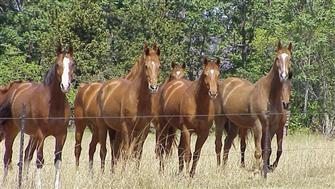
Nyanza Stables and Livery offers your horse a competent,
balanced lifestyle with many new friends to talk to and to graze alongside in
our well maintained grassy paddocks.
LIVERIES
We have livery facilities for:
Permanent residents of Swaziland who either do not
have the option of taking care of their own horse, or would like it all taken
care of for them so as to be able to spend more time enjoying their riding with
an easy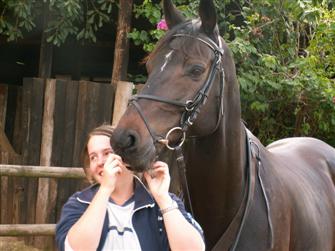 conscience, knowing their horse’s every need is being ably catered for.
conscience, knowing their horse’s every need is being ably catered for.
Those who keep their horse privately or at home, but need a
‘Horse Hotel’ where they can comfortably leave their horse when out of the
country – imagine being able to relax and enjoy your holiday without any worries
as to his well being!!
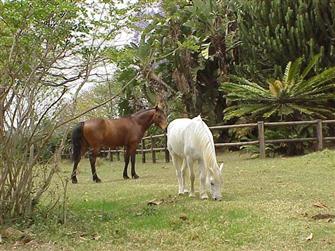 People who have horses in neighbouring countries that need time in the countryside: young horses who need time to grow, injured horses
needing a bit of ‘time out’, or old horses who have worked hard and earned a
peaceful retirement.
People who have horses in neighbouring countries that need time in the countryside: young horses who need time to grow, injured horses
needing a bit of ‘time out’, or old horses who have worked hard and earned a
peaceful retirement.
We find that horses from the big cities such as
Johannesburg thrive in the climate and atmosphere of Nyanza Farm, losing all
their stresses and tensions. It is  ideal for young horses not yet ready to go
into full work, or those whose owners would like them to start their working
career with some valuable schooling and education here on the farm. The farmyard
and country life gives a horse confidence and provides safe ‘bombproofing’ for
those young skittish horses. For those who would like, their horse can also be
hacked out round the countryside. More progressively advanced levels of
schooling is also available for those who want to give their horses a head start
in their competitive careers before returning home.
ideal for young horses not yet ready to go
into full work, or those whose owners would like them to start their working
career with some valuable schooling and education here on the farm. The farmyard
and country life gives a horse confidence and provides safe ‘bombproofing’ for
those young skittish horses. For those who would like, their horse can also be
hacked out round the countryside. More progressively advanced levels of
schooling is also available for those who want to give their horses a head start
in their competitive careers before returning home.
We also have horses here on short term schooling packages
and clinics or Bemer therapy.’

Feed
We feed our horses a recognized brand of balanced horse cubes . Each horse
has its ration individually calculated depending on its age, condition and
workload.
We feed napier fodder (Pennisetum purpureum) or cane tops to the horses every
evening, and eragrostis hay. We are lucky in that we have
a farmer next door who grows cane for seed so it is not burnt – this means they
get a green supplement in winter, which they enjoy.

Our hay is good quality eragrostis imported from South
Africa, from a farmer who reserves sufficient for us all year round.
They graze from approximately 9.00 a.m. to 3.30 p.m. The grazing is roughly
50% stargrass and 50% kikuyu (a couple of the paddocks have a very little amount
of veld grass mixed in with it).
Dipping
We dip for ticks and flies, every week or fortnight depending on
the tick and fly challenge. In winter we dip if we see any ticks or flies.
Vaccinations
All horses are fully vaccinated and these are kept strictly
up to date.
Deworming
They are dewormed every 6-8 weeks. New horses are dewormed on arrival.
Shoeing
Private owners are free to bring in the farrier of their
choice.
Veterinary
Minor ailments are treated by Nyanza staff, for serious
problems veterinary help is sought.
Stables and Paddocks
All the horses are stabled at night.
 Most
of our stables are of rustic design, which blends in well with the countryside
atmosphere, and we use shavings for bedding. Our stables all have automatic water.
Most
of our stables are of rustic design, which blends in well with the countryside
atmosphere, and we use shavings for bedding. Our stables all have automatic water.
Our small paddocks are post and rail, and our large paddocks are two strands
of 8 gauge wire, with one of them electrified with an animal strength electric
fence. Our external fences are full fences.
The horses have water at all times in the paddocks – each paddock has a
water trough with an automatic float valve.
a
water trough with an automatic float valve.
We have 10 hectares of paddocks altogether. Most of them average about
4000-5000 square meters. Droppings are picked up every 5-7 days. The paddocks
have compost spread on them once a year and are usually fertilised each time we
finish grazing them.
Climate
We are in the Middleveld, so have a very pleasant climate – not too hot in
summer or too cold in winter. In summer the countryside is lush and green, in
winter it becomes dry and brown.
Daily Routine
The horses are all checked at 6 o’ clock in the morning, and then they start
their day at 7.00 am when they get their cubes. They are then all groomed and go
out to t he paddocks at 9.00. We have two main groups that graze together, and
then a couple of special cases eg: the very old that we keep separate from the
others – they have their own paddocks with just a couple of friends.
For
those who for some reason can’t go to the main paddocks, we have small paddocks
close by where they are in the middle of the daily action so that everyone
passes them and they get extra attention. If they are in the small paddocks they are given a haynet,
in the big paddocks we usually manage to have grazing all year round. If the
grazing is not sufficient in winter then we supplement with hay during the day.
he paddocks at 9.00. We have two main groups that graze together, and
then a couple of special cases eg: the very old that we keep separate from the
others – they have their own paddocks with just a couple of friends.
For
those who for some reason can’t go to the main paddocks, we have small paddocks
close by where they are in the middle of the daily action so that everyone
passes them and they get extra attention. If they are in the small paddocks they are given a haynet,
in the big paddocks we usually manage to have grazing all year round. If the
grazing is not sufficient in winter then we supplement with hay during the day.
We prefer them to have fly protection if possible, so we ask all livery
owners to supply either a flyfringe or a fly veil.
The horses that get cubes for lunch (depending on their condition/workload)
come in at 12.45 and then go out again immediately afterwards.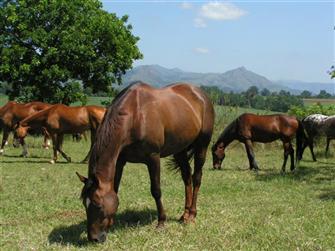
At 3.30 they start coming in for the night. Those who need blankets are
blanketed so owners are requested to provide their own. They get their evening
cubes at 4.30 p.m, and then napier fodder or cane tops at 8.00 p.m.
Evening stables are after the 5 o’ clock feed, when each horse is checked,
and then we check again just before we go to bed. We have two observation
stables built on to a bedroom on the side of the house, so as to be able to
closely monitor anyone who needs watching.
There is also a night-watchman who patrols and checks on the horses and cows.
Ann and Wandy also do late night patrols, and spot checks
in the night.
Management
The stables are run by Wandy Williams and Ann Davies. Wandy has ridden and had horses
here since 1968, and Nyanza has had a minimum of 28 horses here since 1983.
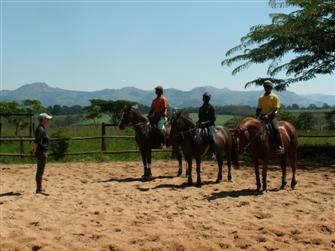
Besides Wandy and Ann there are three senior stable staff (Instructors and Trail
Guides), 8 daytime grooms, a lady who manages the tack-room, and a night-watchman.
Nyanza has a program in place for developing and training
the local Swazi staff members in horsemanship and equitation skills. This
provides a great incentive for those less privileged who would like to further
their riding skills and knowledge.
Schooling, Lunging and Lessons
Facilities
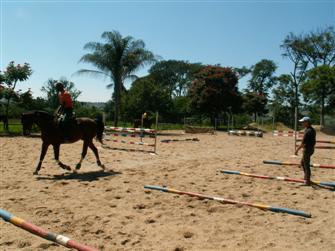 There are excellent facilities for riders to work their horses in. We have
two sand lunging arenas, and our school consists of a large sand school, big
enough to hold two dressage arenas and a jumping area. Our dressage arenas are
made so we can dismantle them and have one large jumping area, suitable for a
whole course of jumps. The sand school has facilities to water it when the
going becomes dusty.
There are excellent facilities for riders to work their horses in. We have
two sand lunging arenas, and our school consists of a large sand school, big
enough to hold two dressage arenas and a jumping area. Our dressage arenas are
made so we can dismantle them and have one large jumping area, suitable for a
whole course of jumps. The sand school has facilities to water it when the
going becomes dusty.
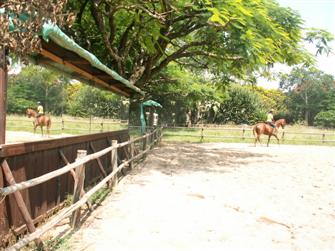
The school has a wall of mirrors so as to enable riders to
study and improve on their way of going. We also have a spacious grass jumping arena.
For those who would like more we offer schooling and lunging of the horse,
and lessons for the rider. We also offer a package for visiting horses which
includes a combination of lessons and schooling of the horse with Ann. These
packages last for anything from five days to long term, depending on your
preference. As well as this we take in horses just for schooling, and offer
lessons on our own horses.
Hacking
We have wonderful countryside for our people to ride through. Our valley is
beautiful and there is no limit as to how far we can go. (See the
trails section
for more photos!)’
Our Tackrooms
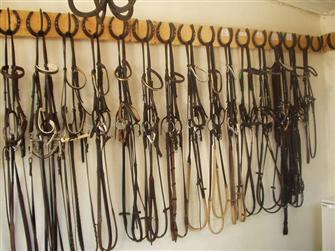
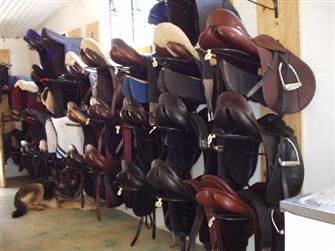
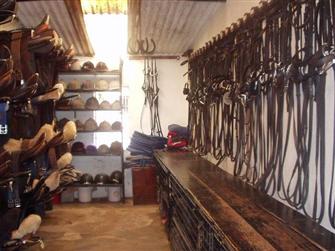
We have two tackrooms. One is for the Riding School and Horse Trails, and the
other is for privately owned tack. The tackroom has been carefully constructed
to be very secure. All tack is cleaned regularly, usually every time it is
used.’
Livery Rates and Payment
Livery fees are due in advance, at the beginning of each month. Extras such
as shoeing, de-worming, vet medicines, etc are paid at the end of the month. If a
vet is called in then the owner is directly liable for the account.
We
offer an early payment discount if you pay before the 10th of the month.
Livery fees do not include lunging/schooling/lessons, shoeing, de-worming,
inoculations or veterinary. They do include dipping.
For our South African customers, we have a South African bank account so
payments can be made directly into it.
Please contact us if you would like more details about the rates for lessons,
schooling, clinics, accommodation, etc.

- Horse Trails
- The stables are open every day for horse trails...
- Riding School
- We have a resident team of instructors...
- Meet our Horses
- take you on a "virtual walk" around our stables...

